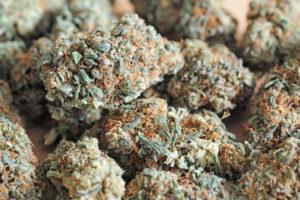Legislation to legalize recreational marijuana was filed today in the North Carolina House of Representatives.
 House Bill 626 was filed by State Representative Johnnie Autry along with three cosponsors – Representatives Kelly Alexander, Mary Harrison and Zack Forde-Hawkins. The law would allow those 21 and older to possess up to two ounces of marijuana flower, 15 grams of marijuana concentrates and 2,000 milligrams of THC worth of infused-products, which they could purchase from licensed marijuana retail outlets. The personal cultivation of up to six marijuana plants would also be allowed.
House Bill 626 was filed by State Representative Johnnie Autry along with three cosponsors – Representatives Kelly Alexander, Mary Harrison and Zack Forde-Hawkins. The law would allow those 21 and older to possess up to two ounces of marijuana flower, 15 grams of marijuana concentrates and 2,000 milligrams of THC worth of infused-products, which they could purchase from licensed marijuana retail outlets. The personal cultivation of up to six marijuana plants would also be allowed.
“Cannabis prohibition, like alcohol prohibition before it, has been a wasteful and destructive failure”, states the preamble to the bill. “About half of Americans admit to having used cannabis despite more than eight decades of prohibition.”
It continues: “Regulating cannabis similarly to alcohol will replace the uncontrolled illicit market with a well-regulated system. Legalization allows regulation and control to protect consumers, workers, communities, and the environment.”
In addition, the bill states that the prohibition of cannabis “has had an unfair, disparate impact on persons and communities of color”, and it “diverts law enforcement resources from violent and property crimes and subjects civilians to unnecessary police interactions” Doing this also “deprives the State of thousands of legal jobs and hundreds of millions of dollars in tax revenue.”
Because of this “the use of cannabis should be legal for persons 21 years of age or older and subject to taxation and regulation in a manner that does all of the following:
a. Controls the production and distribution of cannabis under a system of licensing, regulation, and taxation.
b. Includes lab testing, potency labeling, secure packaging, restrictions on advertising, and education about responsible use and risks.
c. Fosters a responsible industry, whereby businesses will only be allowed to expand if they prioritize diversity, good wages, sustainability, and community investment.
d. Promotes the participation of individuals most impacted by cannabis prohibition in the legal, regulated industry.
e. Generates needed revenue, including to reinvest in communities that have been disproportionately impacted by prohibition, for substance abuse treatment and education, and to train more law enforcement officers to detect impaired driving.
The full text of House Bill 626 can be found by clicking here.
A companion bill to House Bill 626 was filed in the Senate last month. Introduced by Senator Craig Meyer, Senate Bill 346 currently sits in the Rules and Operations Committee.







